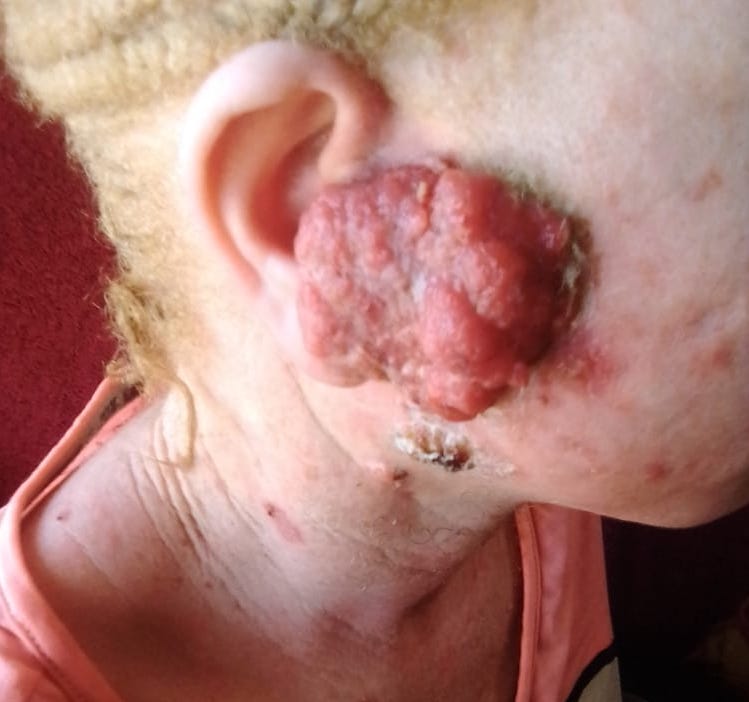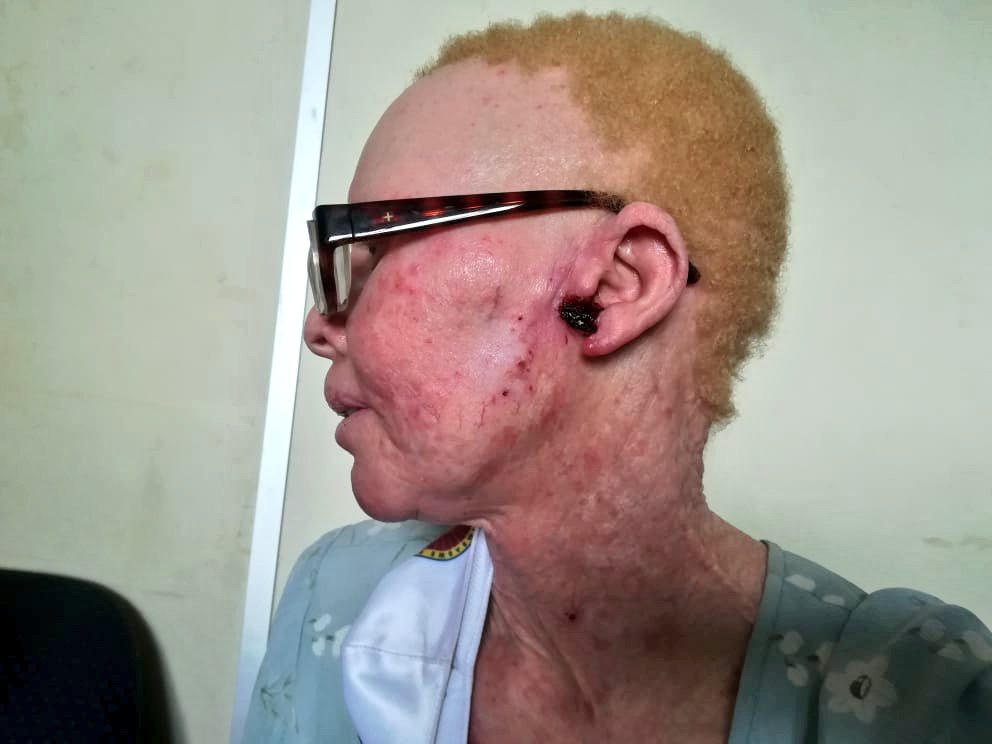By Nokuthaba Dlamini
The prolonged lockdown to slow down the spread of Covid-19 has worsened the plight of people living with albinism, especially in remote parts of Zimbabwe, as they are struggling to access lifesaving treatment for various disorders caused by their condition, investigations have revealed.
Owing to lack of melanin, people living with albinism are more susceptible to the harmful effects of exposure to the sun, which include skin cancers.
The majority of them suffer from eyesight problems and extreme sensitivity to the sun.
Most people living with albinism in Zimbabwe rely on donations for medication for various ailments and the supply of sunscreens to prevent cancers.
A snap investigation by CITE in Matabeleland North, however, revealed that the lockdown regulations to stop the spread of Covid-19 first imposed in March 2020 have left people living with albinism more vulnerable as they cannot access health facilities and products to protect themselves from the harmful effects of direct sunlight.
The flow of donations for sunscreen creams and other products to protect the skin has been disrupted by travel restrictions, spawning an increase in the number of people living with albinism succumbing to skin cancer.
Fifteen-year-old Providence Nyoni, an albino and orphan from Nsungwale in Binga, is one of the people whose life has been turned upside down by the lockdown as she is unable to access treatment for a tumour on her face, which is spreading to her neck.

Nyoni’s condition started deteriorating in September last year and her guardian Joel Sikapila now fears for the worst.
Sikapila said lack of access to hospitals due to the lockdown was forcing them to rely on traditional herbs to treat Nyoni’s septic wound with little success.
“It started as a wound in September last year and her condition has been worsening ever since,” he said.
“We have tried using traditional medicine and anointed water from church, but nothing has worked so far.
“We can’t take her to any health facility because access roads to nearby clinics were destroyed by floods in February last year and there is no public transport.”
The family says it does not have money to take Nyoni to Binga District Hospital for treatment because of lockdown restrictions and lack of funds.
Her condition, however, continues to deteriorate and she can hardly eat.
Widowed Sikapila is the only one looking after Nyoni and the load is getting heavier for him.
“Feeding and bathing her is difficult as she cries a lot because of the pain,” he said.
“I usually seek the help of neighbours to help me feed her because it is not easy as the wound is right under her chin.”
Nyoni’s heart-wrenching story resonated with that of 16 year-old Iphuthilinkosi Lunga from Manjolo, also in Binga, who has cancerous tumours on her legs.
Lunga, a Form 2 student at Manjolo Secondary School, is being taken care of by her grandmother Ellen Lunga after her parents divorced.
“Whenever she gets exposed to the sun, her body changes colour to pale red or purple and her skin often with blisters under her feet,” Ellen said.
“We took her to Binga District Hospital in December last year after her body started swelling and she also had blisters.
“We suspect that she is suffering from skin cancer, but we were turned away by the nurses who said they would come and attend to her at home.”
Just like Nyoni, Lunga’s condition continues to deteriorate and her family is desperate for help.
“I hope they are going to come and assist her because she is unable to walk. She is always in pain,” said a dejected Ellen.
Sanders Munsaka, chairperson of the Albinos Association of Zimbabwe’s Matabeleland chapter, said Binga alone had 60 people living with albinism who were struggling to access treatment for skin diseases.
Munsaka said Matabeleland North had 157 documented people living with albinism and the majority of them were battling various ailments that have been exacerbated by lack of access to health facilities due to the lockdown.
“Matabeleland North has the highest number of people with skin diseases related to cancer and in Binga district, we have about 60 people,” he said.
“Women and girls are the most affected.
“In the same district, we recently lost Champion Mugande from Muchesu village, who succumbed to skin cancer on his neck.
“We also lost another one from Victoria Falls who had cancer on the eye.
“Some cases have gone unreported because of the lockdown.”
Munsaka said sunscreen products were out of reach for many people living with albinism especially in remote areas such as Binga.
In Zimbabwe it is estimated that there are 70 000 people living with albinism.
According to the World Health Organisation, the mortality rate for Zimbabweans with albinism is high, with most people not living beyond 50 years largely due to lack of access to treatment for skin cancer.

Most sunscreen products that are available in Zimbabwe are imported from South Africa.
Sunscreen lotion costs anywhere between US$22 and US$35 for a 250ml bottle at local retail shops.
Alive Albinism Initiative, a non-governmental organisation based in Harare, estimates that at least two people with albinism die of skin cancer every month in Zimbabwe.
“Our rural folks are the most affected due to too much heat and exposure to sunlight,” Munsaka added.
“People living in rural areas don’t get enough protection material and this leads to many cases of cancer.
“Most of them are in need of physiotherapy treatment, which is only done at Parirenyatwa Hospital in Harare.”
The worsening plight of people living with albinism under lockdown has spurred Marvelous Tshuma, who also lives with the condition, to spearhead a charity initiative to help them access treatment.
“These skin wounds that develop into cancer present themselves in a scary manner and we have seen that most of the affected people end up being sort of neglected by their relatives or neighbours as they will be scared to bath them and that’s how their wounds expand until some die, “Tshuma from Binga said.
“Right now I am trying to advocate for emergency help for these people. “But whenever we approach hospitals, they don’t understand.
“They tell us that skin conditions are not classified as emergency care, so they just treat you like any other person and let you go unless if you are well known.
“As a result, some have not made it and it is heart breaking because some have died while we were in the process of getting assistance for them.
“It’s sad and scary at the same time, but I will not be deterred from advocating for suitable policies that respond to our needs.”
Munekayi Padingani, the Matabeleland North provincial medical director, acknowledged that the matter had reached crisis levels and as task team has since been set be to do cancer surveillance in areas such as Binga.
“We are aware of such challenges and this is why we have decided to send out integrated teams to solve the issue,” Padingani said.
“We will be sending them to meet out of people with underlying conditions in those hard to reach areas like Binga and when they need special care, they shall be taken for further consultation with specialists and they will be assisted in that manner.”
A United Nations Office for the Coordination of Humanitarian Affairs (OCHA) Zimbabwe situation report for December noted declining access and utilisation of essential health services during the lockdown “including preventive, curative and rehabilitation services across the country.”
“Furthermore, outpatient consultation declined by 49 per cent in April 2020 (April to October) compared to the same period in 2019,” OCHA said.
